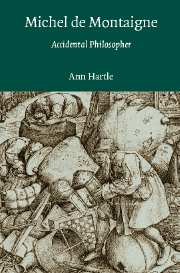Introduction
Published online by Cambridge University Press: 23 July 2009
Summary
This book is intended to show that Michel de Montaigne is a philosopher – that is, that he takes up the most fundamental philosophical questions in a profoundly original, comprehensive, and coherent way. Although his Essays have always been acknowledged as the origin of a new literary genre, they have never been recognized as philosophical in the deepest sense. Montaigne invented the essay because his thought could not be expressed in the traditional philosophical forms.
Those who have written on the philosophical aspects of the Essays have generally placed Montaigne in one or more of three categories. They have seen him as a skeptic of some kind, as a humanist, or as having evolved in his thought through Stoic, Skeptical, and Epicurean stages. Each of these views does capture something of the tone and substance of the Essays, but all are partial and none is as radical as Montaigne's own thought.
The interpretation I present here is based on the moment of self-discovery that occurs in the “Apology for Sebond.” Montaigne is “a new figure: an unpremeditated and accidental philosopher!” I take him at his word: what he is doing in the Essays has never been done before.
Montaigne, then, breaks with both ancient philosophy and medieval theology. Is he, therefore, the first modern? If modernity is essentially the progress of autonomous reason that culminates in the Enlightenment, then Montaigne is not a modern philosopher.
- Type
- Chapter
- Information
- Michel de MontaigneAccidental Philosopher, pp. 1 - 8Publisher: Cambridge University PressPrint publication year: 2003

